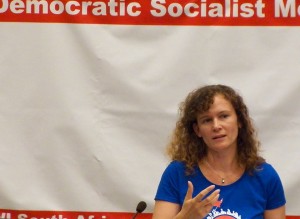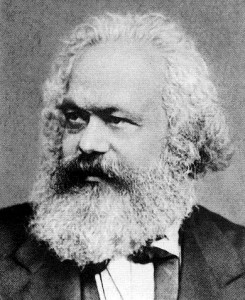Paul Mason Post-Capitalism
Old ideas tend to resurface during periods of capitalist crisis and the appearance of the book by Paul Mason, economics editor of Channel 4, titled Post-Capitalism: A Guide to Our Future has rekindled the idea that new technology will somehow transform capitalism as we know it.
This is a pretty old idea and is based on the premise that the major factor determining economic development is the advent of new technology. Mason’s book has had a mixed reception and generated a fair bit of controversy but now the towering figure of Peter Taaffe, the Generalissimo of the CWI , has entered the fray to share his wisdom. Mason took note on Twitter…CWI leader Peter Taaffe discusses work by me and Rifkin.
Peter Taaffe: Pre-retirement Philosophising
 In a rambling interview published on Socialist World Peter gives us some of his home spun philosophy on Will robots end capitalism? Peter is coming to the end of his very lengthy political career. As he points out himself when answering a question posed by Stephen Hawking that:
In a rambling interview published on Socialist World Peter gives us some of his home spun philosophy on Will robots end capitalism? Peter is coming to the end of his very lengthy political career. As he points out himself when answering a question posed by Stephen Hawking that:
..as early as within 30 years. Machines will be more intelligent than humans, be able to develop by themselves, and possibly destroy and supersede humanity.
Peter reflects deeply and opines:
There is the danger of that. Maybe I couldn’t give you a timescale; I won’t be around by then. So I will not have to deal with the consequences of that question. However, humanity’s posterity will be much more intelligent than us as well.
Not as bright as an earthworm
 Let’s get this one out of the way immediately because, fortunately, Peter is no philosopher of science. In fact he’s no philosopher at all. Machines have not one iota of “intelligence”. In order for anything to be intelligent it must be conscious and machines, no matter how sophisticated and complex, don’t think and can’t make rational decisions. The most high-powered modern computer doesn’t have the consciousness of an earth-worm.
Let’s get this one out of the way immediately because, fortunately, Peter is no philosopher of science. In fact he’s no philosopher at all. Machines have not one iota of “intelligence”. In order for anything to be intelligent it must be conscious and machines, no matter how sophisticated and complex, don’t think and can’t make rational decisions. The most high-powered modern computer doesn’t have the consciousness of an earth-worm.
Wittgenstein
 As the philosopher Wittgenstein noted:
As the philosopher Wittgenstein noted:
Only of a living human being and what resembles (behaves likes) a living human being can one say: it has sensations; it sees; is blind; hears; is deaf; is conscious or unconscious.
The whole discussion about the intelligence of machines superseding human intelligence is based on a misconception. The basic idea being that the human brain is a form of computer and therefore with the development of computer technology we are replicating mechanical versions of brains that have the attribute of human intelligence. However the human brain is not a computer, it is part of a human being that has sentience, consciousness, intentionality and, perhaps more importantly, an ability to make judgements about what is right and wrong.
A US drone, for example, doesn’t “identify” a target and then “decide” to attack it. It doesn’t “calculate” anything and it doesn’t “know” what it’s doing. Presently philosophers cannot even agree on what human consciousness is and how it arises. Given that no machine can have any of the crucial attributes of being human, including consciousness or intelligence, then the idea that they can be more intelligent than humanity in 30 years is pure Sci-Fi baloney or pop psychology for the uninformed.
Taaffe: Mason agrees with me and Marx?
 What other pearls of wisdom does Peter give us? In relation to Mason’s book Peter comes out with an amazing statement:
What other pearls of wisdom does Peter give us? In relation to Mason’s book Peter comes out with an amazing statement:
What Mason begins to touch upon is fascinating. He in fact agrees with us, agrees with a Marxist analysis, that the process of production is reducing the costs of the capitalists to zero or near-zero. As a result, the lifeblood of capitalism, which is profitability, will be sucked out of the system. (!!!!)
Mason agrees with Peter Taaffe and with a Marxist analysis! Lest it be forgotten I am currently suspended as a member of the CWI (for a year and a half now) for alleged dogmatism (and ultra-leftism of course) for arguing that the current capitalist crisis is largely due to precisely this problem in the form of a falling rate of profit.
Peter, to the contrary, says there is “no problem” with capitalist profitability and that this current crisis is due to a lack of demand and deflation. For instance in 2012 Peter stated in a letter in reply to John Smithee:
‘Therefore this crisis is not primarily one of ‘profitability’, as John seems to imply. There are many and differing factors that can lead to or be the immediate cause of a capitalist crisis. The capitalists are presently swimming, literally drowning, in profits. In our Socialism Today article we underestimated the amount of unused capital, profits, stashed in the vaults of the big companies. Latest figures show that £750 billion is ‘fallow’ – not being invested by the capitalists – in Britain alone. It is a huge $2 trillion in the US! The capitalists refuse to invest because there is no ‘profitable outlet’. In this sense, it is a crisis of ‘profitability’. Not because profits have dropped or there is a ‘tendency’ for the rate of profit to decline. Both the rate and the absolute amount of profit have increased, it seems, even during this terrible crisis. (my emphasis) ’
So much for profitability being “sucked out of the system”? It may be possible for it to be “sucked out” sometime in the future when killer robots take over human civilisation but not now? In fact Peter said earlier this year that there was no problem with profits and that this had been “proved” during the profits debate in the CWI. Peter proved his point and “won” the debate with the suspension of myself and Steve Dobbs. Talk about having your cake and eating it too!
Marx: limits of capitalism
 Anyway enough of this twaddle what did Karl Marx say about the limits to capitalist production based on mechanisation:
Anyway enough of this twaddle what did Karl Marx say about the limits to capitalist production based on mechanisation:
“At any rate, it is but a requirement of the capitalist mode of production that the number of wage-workers should increase absolutely, in spite of its relative decrease. Labour-power becomes redundant for it as soon as it is no longer necessary to employ it for 12 to 15 hours daily. A development of productive forces which would diminish the absolute number of labourers, i.e., enable the entire nation to accomplish its total production in a shorter time span, would cause a revolution, because it would put the bulk of the population out of the running. This is another manifestation of the specific barrier of capitalist production, showing also that capitalist production is by no means an absolute form for the development of the productive forces and for the creation of wealth, but rather that at a certain point it comes into collision with this development. This collision appears partly in periodical crises, which arise from the circumstance that now this and now that portion of the labouring population becomes redundant under its old mode of employment. The limit of capitalist production is the excess time of the labourers. The absolute spare time gained by society does not concern it. The development of productivity concerns it only in so far as it increases the surplus labour-time of the working-class, not because it decreases the labour-time for material production in general. It moves thus in a contradiction.” (Capital Vol III Chapter 15 Supplementary Remarks on the Internal Contradictions of the Law of the Falling Rate of Profit)
Post-capitalism isn’t possible within the confines of value production and this is the key. The reason why it isn’t possible is because the system depends upon the extraction of surplus value from the working class which determines the rate of profit as its sole reason for existence. As Marx puts it:
The purpose of capitalist production, however, is self-expansion of capital, i.e., appropriation of surplus-labour, production of surplus-value, of profit. (Capital Vol III on the Internal Contradictions of the Law of the Falling Rate of Profit)
And it must be stressed that it isn’t technological innovation that leads to booms in capitalist production but rather the rate of profit which determines innovation. A low or falling rate of profit curtails productive investment and blocks innovation. Only when the rate of profit is restored through crisis does innovation in new methods of production take place. The motive force of capitalist production is the rate of profit and only once crisis cleanses the system of dead labour, of capital value, can a boom begin on the basis of new technology.
However as Marx astutely observed:
And thus the cycle would run its course anew. Part of the capital, depreciated by its functional stagnation, would recover its old value. For the rest, the same vicious circle would be described once more under expanded conditions of production, with an expanded market and increased productive forces. (Capital Vol III Chapter 15 on the Internal Contradictions of the Law of the Falling Rate of Profit)
We should realise that the falling rate of profit is capitalism’s Achilles heel. The widespread introduction of robots in production will doom capitalism in the longer term and the reason will be a trend decline in the rate of profit leading to an eventual plunge in the rate of profit with a renewed economic crisis that surpasses in scope anything we have seen before.
Yet it isn’t robots themselves that will be the killer of capitalism but the working class that will put the diseased system out of its misery. In the interview Peter comes out with a real howler though. He suggests that the industrial working class has experienced a long-term weakening because of new technology.
This is partially true only in the advanced economies. And even there it’s questionable. The industrial working class in the USA, for example, is still about the same size it was in 1940 even if the population is much bigger. It is immeasurably more productive however and hence potentially more powerful. On a world scale the industrial working class is actually much bigger and has been strengthened massively in the emerging economies.
The industrial working class, on a global scale, is about double what it was during the post war boom in the 1950’s and 60’s. What is required is a rearming of this class with an ideology steeped in the scientific method of Marx’s critique of capitalism. Alas Peter doesn’t even understand this science but still enjoys a good thought experiment before retirement.
Anyway he thinks:
That is why one important aspect of our struggle is to reach students in the universities, but also Left intellectuals, scientists, futurologists. If they are won over from that milieu, and commit to the stand point of the mass of the working class, they could play a prominent role as yeast for the working class movement, particularly in this era.
Maybe Peter has in mind climate scientists like Jess Spear, or the economist Kshama Sawant, in the USA? They certainly are products of an academic petti-bourgeois milieu but obviously we are a bit short on “futurologists”.
Peter finishes with a definition of the meaning of the term “robot” and gazes into the cosmos:
The word Robot comes originally from a word with a similar meaning to slave (from Czech, ’Robota’ – serf-labour, drudgery). So will our slaves revolt? Will there be a new Spartacus? Will there be a new slaves’ revolt which will overthrow human kind, or will we develop alongside of these machines, in a harmonious relationship and conquer the planets?
As Shakespeare wrote:
The fault, dear Brutus, is not in our stars, But in ourselves, that we are underlings.
Robots can never revolt, but the working class certainly can and will! Yet it won’t happen if the ideas of socialists are dominated by science fiction but only when they are armed with the true science of Marxism.

























